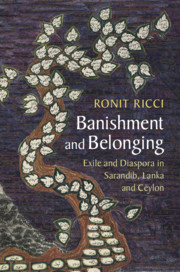Book contents
- Banishment and Belonging
- Asian Connections
- Banishment and Belonging
- Copyright page
- Contents
- Figures
- Maps
- A Note on Orthography and Manuscripts
- Acknowledgments
- Abbreviations
- Maps
- 1 Introduction
- 2 Diasporic Crossings: Malay Writing in Nineteenth-Century Ceylon
- 3 Remembering Java
- 4 “Ceyloned”: The View from the Other Shore
- 5 Exilic Journeys in Time, Place and Writing
- 6 Nabi Adam: The Paradigmatic Exile
- 7 Banishment and Interreligious Encounters: A Malay Ramayana
- 8 Ceylon Malays: Military and Literary Paths
- 9 Malay Writing in Ceylon: Roots and Routes
- Glossary
- Bibliography
- Index
4 - “Ceyloned”: The View from the Other Shore
Published online by Cambridge University Press: 11 November 2019
- Banishment and Belonging
- Asian Connections
- Banishment and Belonging
- Copyright page
- Contents
- Figures
- Maps
- A Note on Orthography and Manuscripts
- Acknowledgments
- Abbreviations
- Maps
- 1 Introduction
- 2 Diasporic Crossings: Malay Writing in Nineteenth-Century Ceylon
- 3 Remembering Java
- 4 “Ceyloned”: The View from the Other Shore
- 5 Exilic Journeys in Time, Place and Writing
- 6 Nabi Adam: The Paradigmatic Exile
- 7 Banishment and Interreligious Encounters: A Malay Ramayana
- 8 Ceylon Malays: Military and Literary Paths
- 9 Malay Writing in Ceylon: Roots and Routes
- Glossary
- Bibliography
- Index
Summary
Beginning with the Javanese verb diselongaké - to be “ceyloned,” i.e. exiled - this chapter investigates a set of questions related to Javanese documentation and memorialization of exile to Ceylon. As a start, it asks whether Javanese authors indeed wrote about exile to Ceylon, a question that has to date not been pursued despite the large number of exiles from Java, and even more so their social and political prominence. Drawing on eighteenth- and nineteenth-century Javanese manuscripts of the historical babad genre, the chapter argues that, although depictions of exile to Ceylon are relatively few and far between, mining local chronicles for references yields a body of insights on how life in exile was imagined and understood in Java, how exile affected those left behind as well as those returning home from Ceylon, and what meanings, tensions and creative possibilities infused narratives of exile.
Keywords
- Type
- Chapter
- Information
- Banishment and BelongingExile and Diaspora in Sarandib, Lanka and Ceylon, pp. 76 - 96Publisher: Cambridge University PressPrint publication year: 2019

